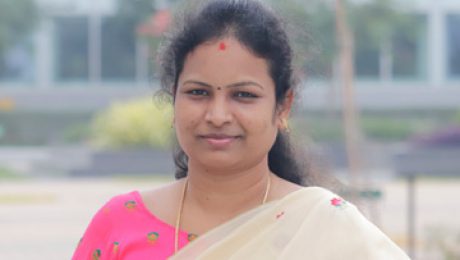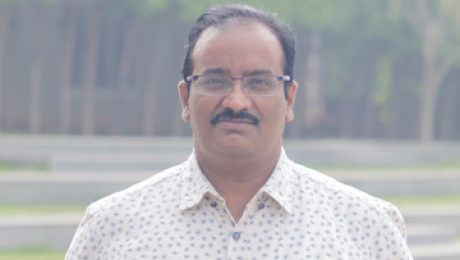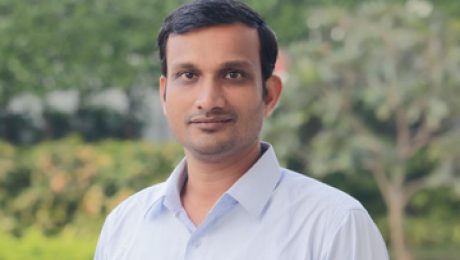Paradigm shift to sustainable systems
Dr. Lakhveer proposes to reduce the cost of bioreactors
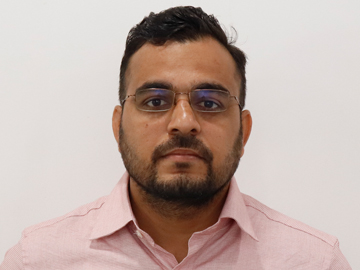 Reputed publishing house Elsevier has published the illuminating research work of Dr. Lakhveer Singh, Assistant Professor, Department of Environmental Science. The book named Bioreactors: Sustainable Design and Industrial Applications in Mitigation of GHG Emissions (1st Edition), is co-edited by Durga Mahapatra, Oregon State University, USA, Scientist and Dr Abu Yousuf, Assistant Professor, Shahjalal University of Science and Technology, Bangladesh.
Reputed publishing house Elsevier has published the illuminating research work of Dr. Lakhveer Singh, Assistant Professor, Department of Environmental Science. The book named Bioreactors: Sustainable Design and Industrial Applications in Mitigation of GHG Emissions (1st Edition), is co-edited by Durga Mahapatra, Oregon State University, USA, Scientist and Dr Abu Yousuf, Assistant Professor, Shahjalal University of Science and Technology, Bangladesh.
Dawn of the 21st century has witnessed a solemn crisis in petroleum-derived fuels, consequently causing a major setback in chemicals/bio-products industries. Also, the researchers identify that the problem of climate change needs to be addressed by reducing the emission of greenhouse gases (GHGs). Dr. Lakhveer states, “To cope up with soaring energy demands, the present generation requires a paradigm shift from fossil-based resources to renewables and sustainable systems which accentuates the necessity of bioreactors for employing bioenergy and bio-products recovery”.
Presently, sophisticated bioreactor technologies have resulted in towering industrial production significantly contributing to the global economy and benefiting human life. Bioreactors have a substantial role in building a sustainable economy and providing food, feed, energy and other basic amenities for a quality life. Numerous bioreactors have evolved over time through sustainable research targeting commercialization.
A bioreactor is a vessel-like device that provides a uniform background for microorganisms to grow. It maintains an uninterrupted balance in the biochemical reactions carried out by these microorganisms to produce the desired metabolites. The applications of bioreactors extend to biomass production such as microalgae, single-cell protein, and yeast. For metabolite formation like organic acids, ethanol, antibiotics, aromatic compounds, and pigments, bioreactors are absolute. It also contributes to transforming substrates like steroids along with supplementing to production of both the intra and extracellular enzymes.
Recently, Dr Singh has developed an innovative cost-effective hybrid bioelectrochemical reactor (15.0 L) in collaboration with Oregon State University, USA, capable of generating efficient hydrogen at a cost less than $2/kg of H2 from lignocellulose hydrolysates or wastewater.
“In our research we have developed numerous types of bioreactors ranging in size from 5.0 to 100 L. A few examples are immobilized up-flow bioreactor, two-stage thermophilic and mesophilic fermenter, sequential dark and photobioreactor as well as hybrid bioelectrochemical reactor for bioenergy production and valuable products recovery from various industrial and agriculture waste. “ informs Dr. Lakhveer.
The book “Bioreactors” presents and compares the foundational concepts, state-of-the-art design and fabrication of bioreactors. Solidly based on theoretical fundamentals, it examines various aspects of the commercially available bioreactors, that includes construction, fabrication, design, modeling, simulation, development, operation, maintenance, management, and target applications for biofuels production as well as bio-waste management. Emerging issues in commercial feasibility are explored in the book along with covering the constraints and pathways for upscaling. It also carries out rigorous techno-economic assessment.
“This book provides researchers and engineers in the biofuels and waste management sectors a clear understanding of the actual potential of various advanced bioreactors for their requirements. It allows them to embark on informed decisions while selecting the appropriate technology models for sustainable systems development and commercialization”, says Dr. Lakhveer.
Advancing his work, Dr Singh is developing efficient and economical bioreactors for commercial applications in the energy and water sectors. In this regard, three international patents have been filed. In the next few months, two more of his books are to be published by American Chemical Society, ACS and Elsevier. The books will emphasize issues and frontiers of reactors technology such as operation, novel design, cost analysis, novel electrodes, nano catalytic materials and other extended applications of bioreactors.
- Published in News, Research News
Small-World Wireless Sensor Network to Help Making Smart Applications for Industries
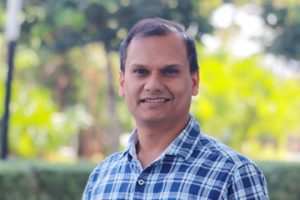 Dr Om Jee Pandey, Assistant Professor, Department of Electronics and Communication Engineering, has recently published two papers in renowned IEEE journals. His paper “Secrecy Performance Analysis of Two-way Relay Non-Orthogonal Multiple Access Systems” was published in IEEE Access Journal, having an impact factor: 4.06. Whereas, “Fault-Resilient Distributed Detection and Estimation over an SW-WSN Using LCMV Beamforming” was published in IEEE Transactions in Network and Service Management (Impact factor: 4.682). The study was done in associations with Prof. Rajesh M Hegde, Department of Electrical Engineering, IIT Kanpur and Prof. Ha H. Nguyen, Department of Electrical and Computer Engineering, University of Saskatchewan, Saskatoon, Canada. His research was focused on developing efficient Wireless Sensor Network services in small-world models. The proposed research can be applied in developing many state-of-the-art applications in the areas related to healthcare systems, climate-smart agriculture, intelligent transportation, home automation, manufacturing, smart utilities, and industries etc.
Dr Om Jee Pandey, Assistant Professor, Department of Electronics and Communication Engineering, has recently published two papers in renowned IEEE journals. His paper “Secrecy Performance Analysis of Two-way Relay Non-Orthogonal Multiple Access Systems” was published in IEEE Access Journal, having an impact factor: 4.06. Whereas, “Fault-Resilient Distributed Detection and Estimation over an SW-WSN Using LCMV Beamforming” was published in IEEE Transactions in Network and Service Management (Impact factor: 4.682). The study was done in associations with Prof. Rajesh M Hegde, Department of Electrical Engineering, IIT Kanpur and Prof. Ha H. Nguyen, Department of Electrical and Computer Engineering, University of Saskatchewan, Saskatoon, Canada. His research was focused on developing efficient Wireless Sensor Network services in small-world models. The proposed research can be applied in developing many state-of-the-art applications in the areas related to healthcare systems, climate-smart agriculture, intelligent transportation, home automation, manufacturing, smart utilities, and industries etc.
In order to develop efficient Wireless Sensor Network (WSN) services, several methods have been proposed for node localization, clustering of sensor nodes, new routing algorithms, adaptive duty cycles, usage of mixed-transmission models, placement of intelligent gateways, usage of mobile elements, and bypassing holes. However, the introduction of small-world characteristics in a WSN has hitherto not been used in this context. A small-world network is typically characterized by a low average path length and high average clustering coefficient and has been widely used to model social networks. However, small world models have not been used in the development of WSN. The primary objective of this research is to develop small world models for WSN services such as sensor node localization, data gathering, data fusion, network lifetime maximization, energy-balancing, reduced data transmission delay, time synchronization, energy-harvesting, and robust distributed detection and estimation. A small world WSN reduces the number of hops required for data transmission, and maximal utilization of sensor nodes closer to the sink. Other advantages of small world WSN include efficient bandwidth utilization, increased network lifetime, and fast convergence of event detection and parameter estimation. Small world WSN developed in tandem with novel routing strategies leads to improved WSN services for various applications.
In WSNs, sensor devices transfer the data cooperatively using multiple hops over a network. Multiple hops required for data transmission over a WSN leads to reduced network performance in the context of device localization, energy efficiency, energy balancing, data latency, speed of event detection and parameter estimation, and network robustness. This is because of poor distance estimation between sensor device pairs, maximum utilization of sensor devices closer to the sink, and a short radio range of sensor devices. Hence, the primary focus of this research work is to reduce the number of hops required for data transmission. In this context, Small World Characteristics (SWC) can be introduced in a WSN, leading to a small world WSN (SW-WSN). An SW-WSN is a well-connected network with reduced hop counts between node pairs.
Small world phenomena were first observed by Stanely Milgram in social connectivity of people. Later, it came out as a theory of “six degrees of separation”. Six degrees of separation claims that all people are six, or fewer, social connections away from each other. This theory is also known as the 6 Handshakes rule. Further, small-world phenomena have been investigated in graphs. Subsequently, SWC is observed in wireless networks. In general, small world WSNs (SW-WSNs) are characterized by low Average Path Length (APL) and high Average Clustering Coefficient (ACC). For an undirected WSN with N nodes, representing a regular network, the APL increases linearly with the number of nodes present in the network. On the other hand, in a WSN having SWC the APL, between two randomly selected nodes grows proportionally to the logarithm of the number of nodes in the network. “WSNs are spatial graphs, where links are created using radio connectivity. There is a limit on the radio range of a sensor node, hence in such networks, the long-range connections are generally absent. Thus, these networks are clustered, but they do not experience small-world phenomena. Hence, the primary focus of this work is to develop SW-WSN using various methods leading to efficient WSN services” explained Dr Pandey.
Dr Pandey is now busy to take the studies further. His future projects include-
• Small World WSN (or SW-WSN) Development for Smart Healthcare.
• Cognitive SW-WSN for Energy-Efficient CPS and IoT applications.
• Climate Smart Agriculture using Cognitive SW Characteristics.
• Low-Latency and Intelligent Transportation over small world CPS.
• Multi Sensor Fusion over SW-WSN for CPS/IoT Applications.
• Information and Context Quality in WSN, IoT and CPS Networks.
- Published in ECE NEWS, News, Research News
Preparing students to become a global leader
Prof. Jayaseelan Murugaiyan on plethora of opportunities at SRM AP
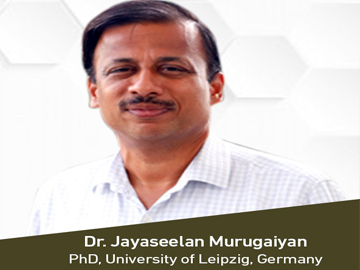 SRM AP, Andhra Pradesh brings an opportunity for the aspiring students to stay informed and ahead of their peers. Through a webinar hosted by Prof. Jayaseelan Murugaiyan, Professor and Head of the Department, Biology & Biotechnology, Ph.D. program admission coordinator, the exceptional SLABS program of the university was highlighted. Prof. Jayaseelan introduced SRM AP through a video enunciating the faculty, research, and students. He spoke of the higher education, job, and research opportunities that a student can expect after graduating from SRM AP. “SRM AP is a research-based university located amidst the greenery accentuating its green campus.”, says Prof. Jayaseelan.
SRM AP, Andhra Pradesh brings an opportunity for the aspiring students to stay informed and ahead of their peers. Through a webinar hosted by Prof. Jayaseelan Murugaiyan, Professor and Head of the Department, Biology & Biotechnology, Ph.D. program admission coordinator, the exceptional SLABS program of the university was highlighted. Prof. Jayaseelan introduced SRM AP through a video enunciating the faculty, research, and students. He spoke of the higher education, job, and research opportunities that a student can expect after graduating from SRM AP. “SRM AP is a research-based university located amidst the greenery accentuating its green campus.”, says Prof. Jayaseelan.
In this webinar, Prof. Jayaseelan discusses about the 10 departments of SLABS that offer various degrees including B.Sc. (Hons.) and B.A. (Hons.). In addition, 6 foundation courses are made compulsory to broaden the learning sphere of the students. The multi-disciplinary curriculum equips the students to be prepared and compatible with the industry requirements, improving their employability in the global market. Prof. Jayaseelan asserts, “Since the disciplines are blurring and blending, the unique foundation courses make our students leaders in their field”.
All the faculty of SRM AP hold Ph. D from renowned Indian and international institutes along with extensive global exposure. They provide excellent mentorship to the students in terms of higher education, research, and national/foreign internships. They also guide the students to pursue the ideal career paths.
Prof. Jayaseelan further discusses the course structure which includes 3 years of the degree course and 1 year additional for availing diploma course, if the students opt for the same. The diploma course focuses on preparing the students for a master’s program abroad. Prof. Jayaseelan informs, “We believe in strong theoretical knowledge and confidence in handling instrumentation and equipment’s is important whether it be for higher studies, finding job or to venture own ideas as a successful entrepreneur.”
SRM AP has active learning centers where 5-6 students are grouped, and the groups are urged to discuss current challenges and issues of the study field. This challenging framework nurtures the spirit of teamwork and improves the problem-solving abilities of the students. They emerge with a clear understanding of concepts as the discussions widen their knowledge base.
The webinar concluded with a question and answer session. Among 77 students who attended the session, many of them proactively inquired on basic curriculum, module, credit system, core courses, electives, and diploma course. When a student requested Prof. Jayaseelan to enlighten them on internships offered to the senior students, he explained that a student did her internship from JNCASR, a massive opportunity rarely provided to undergraduate students. Furthermore, he explained the selection process where the applicants will be called for a written test/interview. The panel evaluates the intent and analysing ability of the students instead of testing their memorizing skills. Apply Here
Prof. Jayaseelan also updates that SRM AP has training cells, Fablab, and Next Tech Lab, where the students get an edge over their peers. Along with it, students talk on nationally/internationally recognized journals during frequent colloquiums organized by SRM AP. Furthermore, the professor informs that faculty trained from MIT University is about to open another cell at SRM AP to encourage the budding entrepreneurs, where their ideas will be complemented with proper planning and direction. The SLABS program has opportunities galore in store for young minds interested in every realm.
- Published in Webinars
Fostering a safe and healthy workplace at construction site
British Safety Council applauds JMC Projects (India) Limited – SRM University AP
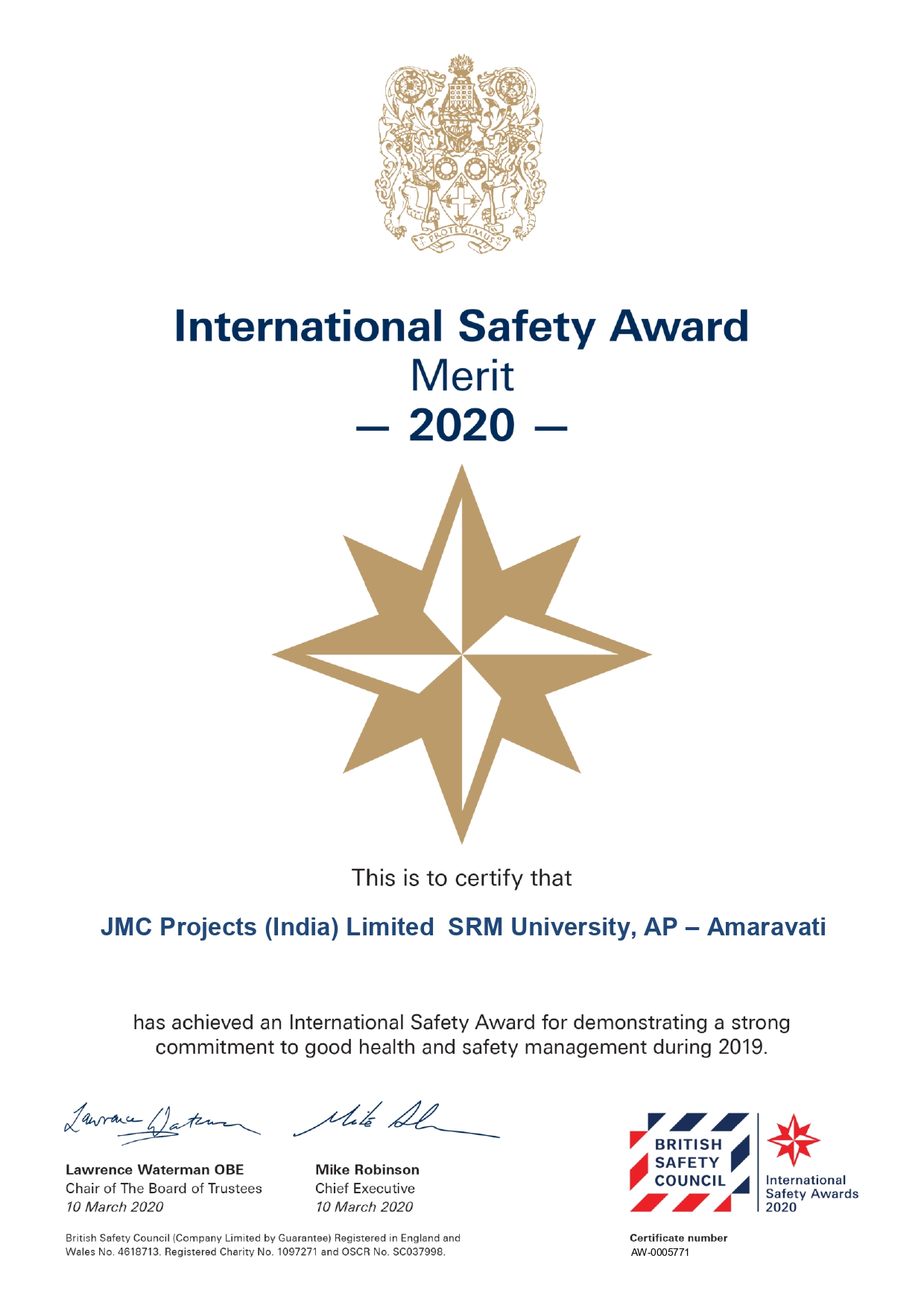
The green campus of SRM AP, Andhra Pradesh is in the process of expanding to ensure a place that continuously inspires and nurtures the students. The buildings foster a new culture of learning that is multi-dimensional, global, social, experiential, and interactive. Designed by Perkins + Will, the American architecture firm which specializes in educational institutions and has been involved in developing some of the marquee structures in this category, JMC Projects (India) Limited took up the monumental task of constructing the buildings of SRM AP.
British Safety Council has awarded the International Safety Award with Merit 2020 to JMC Projects (India) Limited SRM University AP, Andhra Pradesh for its commitment to keeping the workers and workplaces healthy and safe during the 2019 calendar year. The prestigious award recognizes and celebrates the organizations from around the world which have shown a true dedication to prioritizing the safety of the workers and workplaces and have made outstanding advances to achieve it. It requires organizations to invest in workers’ health, safety, and wellbeing. The business leaders, managers, and staff play a crucial role in making health and safety a reality and inspiring their colleagues to do the same.
The joint venture of JMC Projects (India) Limited and SRM AP have pledged to continue maintaining the international standard in the future.
- Published in News
Scaling up waste remediation through nanoenzymes
Dr. Lakhveer Singh on clean and affordable bioelectrofuels
“Nanoenzyme as a cutting-edge innovation that makes bioelectrofuels more affordable and efficient for sustainable future”
Dr. Lakhveer Singh, Assistant Professor, Department of Environmental Science, publishes a paper on “Bioelectrofuel Synthesis by Nanoenzymes: Novel Alternatives to Conventional Enzyme” in the journal “Trends in Biotechnology” with an Impact factor of 13.74. The paper discusses the vital role of nanozymes to advance Bioelectrochemical cells platforms for improved bioelectrofuels generation and waste remediation. Nanozymes are nanomaterials with intrinsic enzyme-like characteristics that have gained importance over the past decade because of its capability to address the limitations of natural enzymes – low stability, high cost, and difficult storage.
Waste recycle and reuse is the need of the hour, and are the most prioritized research in the 21st century. Innovation with present-day technologies as “Bioelectrochemical cells” with a focus on waste remediation, recovery and reuse is believed to strengthen the resource security along with building a sustainable and resilient society. “In order to mitigate several challenges pertaining to the ineffectual performance of microbial catalysts in electrode frameworks, nanomaterial-based nanozymes exhibit capabilities to boost their efficiency by enhancing microbial connection and interaction with electrode surface.”, explains Dr. Lakhveer.
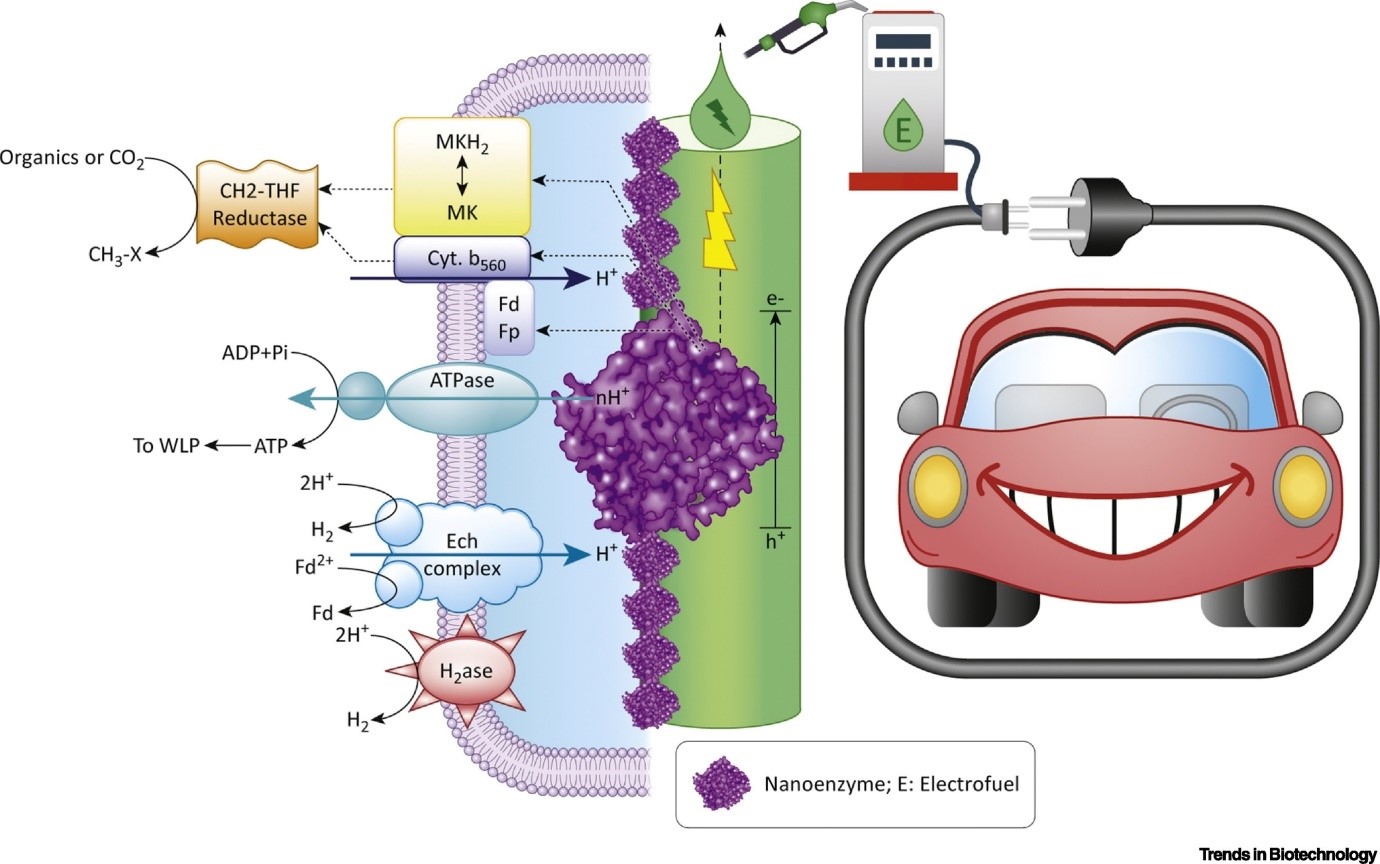 Mechanisms of Nanoenzyme–Microbe Interaction That Facilitate Bioelectrofuel Production
Mechanisms of Nanoenzyme–Microbe Interaction That Facilitate Bioelectrofuel Production
THe further says, “The application of nanoenzymes to replace natural enzymes for improved bioelectrofuel production has long been under-rated. Recent advancements in bioinspired mimetics have led to applying nanoenzymes as a favourable bifunctional or multifunctional tool to achieve large turnover frequencies and high stability in bioelectrochemical platforms. Despite a few technical impediments, nanoenzymes guarantees clean and affordable bioelectrofuels”.
For long-term operations, biocompatibility is observed to remain a challenge associated with nanoenzymes. This is because of the concurrent shape change of nanoparticles during its gradual decomposition that often alters their electrocatalytic behaviour in response to prolonged operation, thus adversely affecting the electrofuel productivity. This paves the path for the future research work of Dr. Lakhveer which will focus on the preparation of nanoenzymes based electrocatalysts with doping of plasmonic or paramagnetic noble metals. This will counter the issue of mass loading and slow down the gradual decomposition process to ensure uninterrupted bioelectrofuels supply during long-term operation.
- Published in News, Research News
Webinar: Learning in Challenging Situations
The Industry Readiness Webinar Series- 3
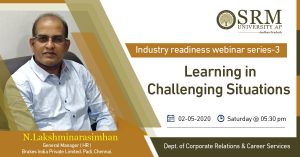
The Industry Readiness Webinar Series provides a forum for the industry experts to share their experience with the students. Through the video workshop, lecture or presentation hosted online; the Speaker uses the platform to share beneficial knowledge, ideas and updates with the stakeholders.
The purpose of the webinar series is to engage an industry expert to host a weekly seminar on a broad spectrum, about the expectations and the pedagogy required to bridge the gap between the academia and the industry on various aspects.
Our guest for the week is Mr N. Lakshminarasimhan, General Manager (HR ) at Brakes India Private Limited. Padi, Chennai and Life member in ISTD (Indian Society for Training and Development) and currently holding the position of Hon.Treasurer of Chennai chapter. He will be sharing his 30 years of experience in Technical Training, Manpower Planning & Recruitment, Employee Motivation and Talent Life Cycle Management etc. with the students. He is known for his motivational sessions on various topics (Technical/ behavioural) including press tool manufacturing, tool design, lean manufacturing, TPM, Modern manufacturing practices, Industry 4.0, Career guidance and readying for the industry at more than 125 colleges in the past 8 Years. He believes that every person has got the potential to scale greater heights, if rightly guided, coached and motivated.
The webinar series includes a wider reach and ability to share knowledge and inherent opportunities to reach out many industrial experts, thereby getting the knowledge imparted from the industry and accessing the general requirement of the industry, which may be very much useful at the time of their campus recruitment.
- Published in Webinars
Next-Tech Lab Scaling New Heights: Won Three Hackathons in a Row
The unstoppable team of Next-Tech Lab of SRM University- AP, has again brought laurels to the University by winning three hackathons in a row. During this lockdown while some devoted their time to newfound hobbies, our young researchers successfully developed a fresh multiplayer virtual reality game – ‘Whack A Mole’ and a cloud-based multiplayer FPS in Virtual Reality- ‘Desert Shooter’. The three-member team has successfully bagged the second prize in the International / Professional Award at SKYHacks2020; Best echoAR Hack at Silicon Valley Hacks; and Best AR/VR hack at HackNow, organized by Cal Hacks, a non-profit organization at the University of Berkeley, California.
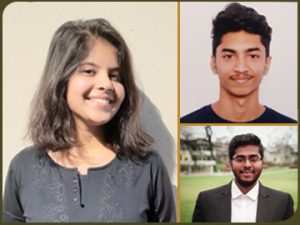
Karthik, Koushik & Khushboo (Clockwise)
When asked how the idea of making such a game crossed their minds, Epperla Karthik, a 2nd Year student of Computer science and Engineering and a member of the team, said, “My family loves attending Tradeshows, every time we attend one my dad and I challenge each other to win a game of Whack A Mole. But, due to strict quarantine that my family is following, it’s been a while now for such challenges. My teammates and I, being gaming and virtual reality enthusiasts, decided to develop a VR version of ‘Whack A Mole.’”
‘Whack A Mole’ is a multiplayer virtual reality game that allows users to play against the computer or their families or both! One can use it on iOS or Android. It is built on Unity3D, on top of Photon PUN and GoogleVR SDK. It is also integrated with Google Firebase. “This was the very first time we were working on the development of virtual reality games and networking. As we had to run the game on our phone to record the gameplay, the output video on YouTube is a bit blurry,” explained Khushboo Sharma, another member of the team and a 2nd-year student of Computer Science and Engineering. “We completed the development of the game in only 20hrs, starting from scratch. We developed a few of our own UI elements and game assets. I feel the User-Interface of the app and the effects are pretty cool. VR development is real FUN! Moreover, there are a lot of API and SDK that unity supports,” exclaimed Koushik Bhargav, a 3rd-Year student of Computer Science and Engineering and the third member of the team.
‘Desert Shooter’ is another multiplayer virtual reality game developed by the team that allows users to play against the computer or their families or both. You can connect with your friends and play together. The game consists of a swarm of robot ships moving towards you and you have to protect yourself from them. “The interesting part is that all of this happens in Mixed Reality which makes the game immersive. We built it on Unity3D, on top of Photon PUN and GoogleVR SDK, Echoar. It is also integrated with Google Firebase and the assets are stored in echoar cloud. This project won the best AR/VR hack at “Hack: Now” which is organized by the University of California Berkeley,” said Epperla Karthik.
The team has plans to make this game to be a cross-platform game. Therefore, their next plan of action is to make the web version of it. The team is also planning to release it to production so that users can have an immersive experience of modern gaming techniques.
It is again proved that pure talent can never be put in quarantine. It will always find a way to express itself to the world. Our young developers have brilliantly used the ample time and opportunity to put their brains in best use and to bring recognitions from nationally and globally acclaimed competitions.
- Published in CSE NEWS, News, Students Achievements


